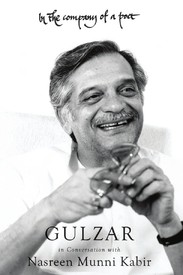 I wasn’t quite sure what to expect from In the Company of a Poet – a conversational book about the life and work of Gulzar. As a devout Gulzar fan I was excited to get to know more intricacies and details about his work, his past, and outlook on life. But I was skeptical if the book that resulted from a few hours of conversation on Skype would be able to delve into the depths of the vast ocean that is Gulzar.
I wasn’t quite sure what to expect from In the Company of a Poet – a conversational book about the life and work of Gulzar. As a devout Gulzar fan I was excited to get to know more intricacies and details about his work, his past, and outlook on life. But I was skeptical if the book that resulted from a few hours of conversation on Skype would be able to delve into the depths of the vast ocean that is Gulzar.
But I was pleasantly surprised that the book offers a fair amount of bits and pieces that kept me intrigued. The details of his childhood and first encounters with poetry and literature were quite interesting. He begins this conversation with a poignant poem that he wrote (see below) for his rather distant father who disliked his son’s literary ambitions. His father thought that writing was a poor man’s job, and was sure that Gulzar would not be able to make anything of his life: “Ye bhaiyon se udhaar mangega aur gurdwara ke langar mein khana khayega.”
Father
There is so much to say that is left unsaid
If you were here I would speak
You were so despondent on my account
Fearing my poetry would drown me some day
I am still afloat, father
No longer have I the desire to return to shore
The shore you left so many year ago.
Most of the first half of the book revolves around his childhood and struggling days in Bombay. Perhaps it takes a poet to remember the past with such minute details, but I was amazed by such sharp memory of this septuagenarian. His detailed recollection of events from five or six decades ago creates a vivid picture of his past. Apart from his indelible memory, another thing you can’t help but notice is how amazingly charming and candid Gulzar’s outlook on life is. He finds gentle humor everywhere, even in mundane events. This is not one of those grumpy old men who scoff at the new technology and revile the new generation. He actually embraces them wholeheartedly, and perhaps therein lies the reason why he is so successful even at this age. Another recurring theme is his love for tennis, which he plays every day. (His favorite tennis player is Federer. “I enjoy the way Federer plays. He is cool and has a gentle smile. The only thing I have against Nadal is the villainous grimaces he makes.”)
There’s so much elegance in his prose, and depth in his thoughts, that I felt like poetry was dripping from every page of this book. Even though I was reading, in my mind I could hear him speak. Consider the following reply to a simple question about his daily routine:
I wake up at five when it’s still dark.
I want the sun to look for me instead of my looking for the sun.
Just as the first serve in tennis can be advantageous,
so the first serve must be mine.
The second one goes to the sun.
Some other phrases that particularly struck me were: ‘shadow of words’, ‘dictionary of subconscious’, ‘words should amaze or amuse’, ‘sust-ul wajood‘ (loosely translated as ‘lazy bones’).
Personally, I would have preferred to read more about Gulzar’s work and philosophy, rather than about the people in his life. Nonetheless, these discussions provide delightful insights about his associations and collaborations with legends like Bomal Roy, Hemant Kumar, Hrishikesh Mukharjee, Shailendra, and many more. I was a bit disappointed that Nasreen Munni Kabir, the author, didn’t ask specific questions about his songs and poems. While discussing his first song Mora gora ang lai le, the only question Nasreen asks him is about the choice of the phrase ‘lai le’ instead of ‘le le’, which was perhaps the last thing I would have asked him about that lovely song. But few gripes aside, I enjoyed reading this book. It was a breezy read, and it surely throws light into some unexplored areas of Gulzar’s life and work. Thanks to my dear friend Jatin who kindly lent me this book.
When will I get to read the book?
I will give it to you when we meet next time.
Classic book, aptly written…Just Completed!
rakevein.wordpress.com
VIshal, I have another book by Nasreen Munni Kabir about Lataji, and it is also an interesting book. In her conversations with Nasreen, Lataji goes into details about her relationships with all the influential music directors of the time (Ghulam Mohammad, SD, RD, SJ, Madan Mohan, etc) who made memorable music with her. The thing that I liked the most though was the delightful compilation of black and white photographs of Lataji with the aforementioned music directors; the simplistic beauty of these pictures blows you away!